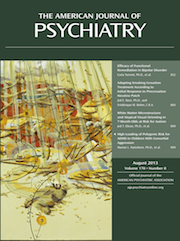Efficacy of Functional Remediation in Bipolar Disorder: A Multicenter Randomized Controlled Study
Abstract
Objective
The authors sought to assess the efficacy of functional remediation, a novel intervention program, on functional improvement in a sample of euthymic patients with bipolar disorder.
Method
In a multicenter, randomized, rater-blind clinical trial involving 239 outpatients with DSM-IV bipolar disorder, functional remediation (N=77) was compared with psychoeducation (N=82) and treatment as usual (N=80) over 21 weeks. Pharmacological treatment was kept stable in all three groups. The primary outcome measure was improvement in global psychosocial functioning, measured blindly as the mean change in score on the Functioning Assessment Short Test from baseline to endpoint.
Results
At the end of the study, 183 patients completed the treatment phase. Repeated-measures analysis revealed significant functional improvement from baseline to endpoint over the 21 weeks of treatment (last observation carried forward), suggesting an interaction between treatment assignment and time. Tukey’s post hoc tests revealed that functional remediation differed significantly from treatment as usual, but not from psychoeducation.
Conclusions
Functional remediation, a novel group intervention, showed efficacy in improving the functional outcome of a sample of euthymic bipolar patients as compared with treatment as usual.



